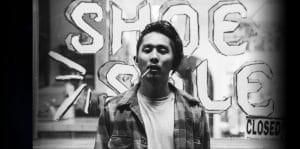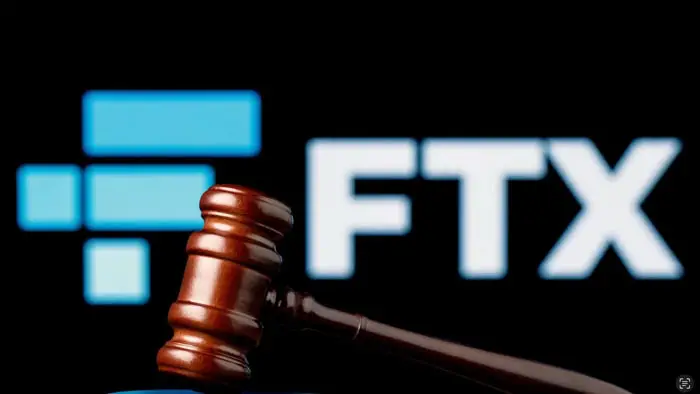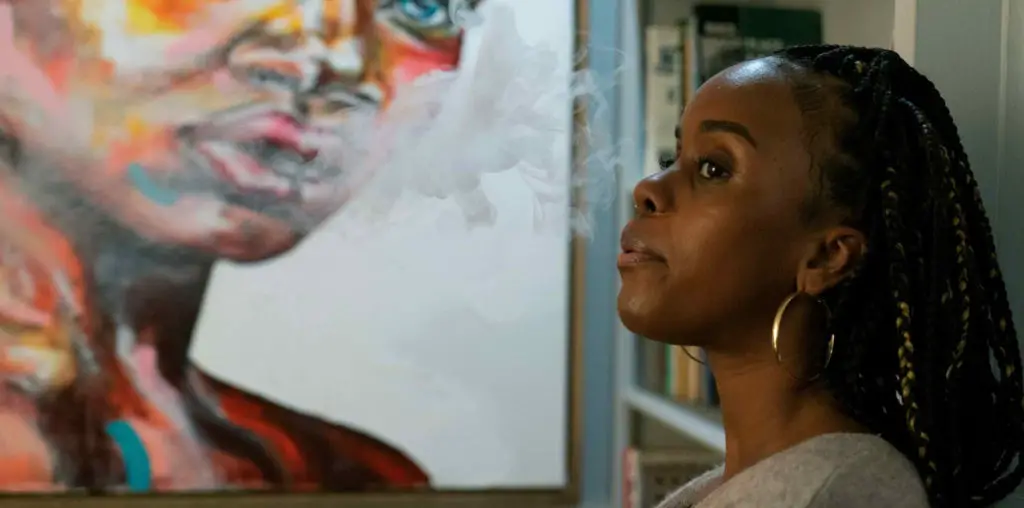
On April 29, 1992, rioting spread across Los Angeles after four Los Angeles police officers were acquitted for the beating of Rodney King. For six days, thousands of people rioted causing widespread civil disobedience, arson, looting, and caused over $1 billion in property damage. The rioting ended upon the arrival of the National Guard, Infantry, and Marines.
Twenty-five years later, I spoke with actor/filmmaker Justin Chon about his second feature film, Gook. Taking place during the first day of the LA riots, it’s the story of Eli and Daniel (Justin Chon and David So), two Korean American brothers and their relationship with a neighborhood 11-year-old African American girl, Kamilla (Simone Baker). The two brothers run a women’s shoe store in the city of Paramount.

Gook is not specifically about the Los Angeles Riots. What was your personal experience during the riots?
My dad had a business in Paramount right across the bridge from Compton. We got looted the last day, so my family has a very personal, experience with the riots. But as it pertains to the riots as a whole, there hasn’t been many stand-alone films about it. You watch Straight Outta Compton, there’s like a tiny segment that talks about it. And there are films that will be coming out, but none from the Korean American perspective. The interesting thing about this film is it’s just as much an African American film as it is a Korean American film. I think it’s just a unique sort of take on that event the tension that was present during that time.
“…two Korean American brothers and their relationship with a neighborhood 11-year-old African American girl…during the first day of the LA Riots.”
We’re living in a politically correct time. Talking about racial issues can be like walking on eggshells. I would imagine it was hard to write a real story involving racial tension.
Yeah, you know, a big thing with this type of story is what the purpose of it is? And my purpose is, of course, a film of friendship, but the last thing I wanted to do was alienate people. If you watch the film, I try not to preach, and I try not to take sides. When you watch the film, it’s very neo realistic. I don’t put judgment on people, and everybody gets their fair share of screen time. And if you notice, everybody’s angry. No one’s angrier than the other. Everybody has struggles with their lives. That’s more what I wanted to focus on, rather than saying you’re right and I’m wrong, and I’m right and you’re wrong. Because the film builds empathy for all the communities in those affected areas, it should touch on what they were feeling at the time.
Your film, Gook, really has no heroes or villains. It’s about people who are confronted with tough choices and circumstances that test their character.
Yeah, and as a writer, that’s a fine line and a very hard line to ride because for it to be a film, there’s certain elements and structural things that you have to put in place for people to stay on board. You can’t just have them, just bantering the entire film. There need to be plot points for the audience to follow. Otherwise, you’ll lose them. So that was very difficult to kind of navigate.

Can you speak to casting children? Your 11-year-old star Simone Baker has a natural feel to her acting, unlike the over-the-top acting you may find on the Disney Channel.
Yeah, you mentioned the Disney sort of actresses, and we saw a few, and they were just too polished. So, we got a tip from one of our production coordinators that they had cast something out of Fernando Pullum Art Center. And so we went there. At first, we called a lot of African American churches in the greater Los Angeles area, but it just took awhile. So we went to Fernando Pullum, and we saw they were preparing for a play. So I’m running around, and I saw Simone. Immediately she had a gravitational pull. After we heard her sing, we’re like, “Okay. she seems very interesting.” Then we held auditions, and she just killed it. Simone and I just spent a lot of time together. We hung out a lot. We talked about stuff. We would skateboard in the parking lot. We just hung out, and to me, that was the most valuable time.
I think a lot building trust and trying to help Simone build confidence and be comfortable so that it’s a safe environment. She knows that we’re gonna be there for her and not put her in some really dangerous situation. Like the film, as you saw, there’s a lot of dangerous stuff that happens.
“Because it’s black and white, you really focus on the characters.”
Let’s talk about your journey as a filmmaker. Your first film, Man Up, which is currently on Netflix, is a very different story than Gook. What was it like filming your second movie and then doing a drama versus a comedy.
As an actor, I’ve been on so many sets. So that’s sort of my school, but when you put into action, you gotta practice. I’ve done tons of shorts. I’ve done a lot of experimental shorts that no one will ever see, but Man Up was a good sort of practice run. And it was low stakes because it was a stoner comedy. But I got to work out a lot of kinks. I got to learn how to work with people, like work with a lot of different personalities. And I love that movie. Whether other people find it amusing or not, I still stand by it. If I didn’t do that movie, I would not have been able to make Gook the way I did. In terms of challenges, as it pertains to doing Gook or doing Man Up first, it was just like a progression. Whether it’s acting or directing or writing, It’s a lifelong endeavor. It’s art. I don’t think artists ever stop creating and I’d like to continue to make films and act and write and I don’t think I need to be limited to one category. It’s a work in progress.

The worst thing for an artist to do is to NOT create.
Yeah, and I also think creating out of fear is the worst. With Gook, I wasn’t creating out of fear. I was thinking, “Okay I gotta just do this and do it the way I want to do it.” Rather thinking, “Oh man, I hope it’s good or not good.” That inhibits your creativity. I just hope to continue to get better. Because you know Gook, I think it’s a good film. I like it, but it won’t have any effect, I try to consciously not let it affect how I make my next film.
“…rather than saying you’re right and I’m wrong, and I’m right…the film builds empathy for all the communities in those affected areas.”
Gook was filmed in black and white. The art of filming in black and white is more than just taking color away. What was the reason to go black and white, and then was there a philosophy in the way that you shot the film?
Absolutely. So, the biggest influence for this film is La Haine, and there’s a lot of parallels between the film’s themes. That’s a French film from the early 90s and it incorporates innovative camera techniques. You know, where you push in and you zoom out? That really cool effect. They do it the best in that film. It is something that made Vincent Cassel famous and put him on the map. But because the film was black and white, you really focus on what he’s doing with the camera, because you’re not distracted by the glitz of what a color palette can do.
For the philosophy of this film, it’s about simplicity. We’re moving the camera a lot, but because it’s black and white, you really focus on the characters. I met with my DP, Andy Chang. He’s really talented, and I’d work with him on some experimental stuff. In preparation of the film, I had said to Andy, “I want this and this. Here’s some comps.” I showed him films like La Haine, Ida and A Coffee in Berlin. In turn, Andy brought comps of Schindler’s List! I was like “What? Dude!” But it made sense, he was just like, “this is how you can shape the light. We can use really harsh lighting and bring attention to this area with the light.” It was really interesting and fun to be able to tell the film through black and white.
There are a lot of interesting shots, and I noticed a lot of the interiors had a lot of harsh but diffused light going on.
We used a lot of smoke. It was really annoying because a lot of times we were waiting for the smoke to diffuse. Another thing, because you’re not dealing with color, it becomes a vérité, neo-realistic film, so you don’t want to use too much artificial light. So the position of the sun was extremely important. And being an indie film, you’re trying to shoot something as simple as a coin to where the sun is…
And you have one shot to do it.
It’s a nightmare, yeah.

Gook opens in Los Angeles on August 18 and nationwide on August 25.


